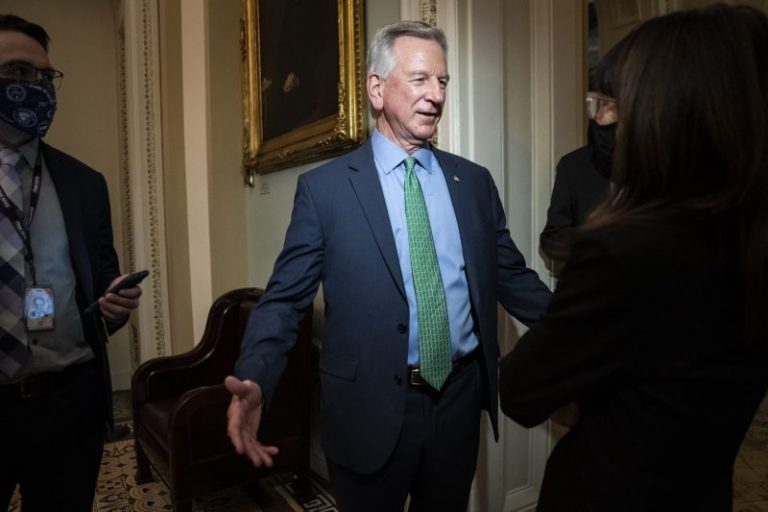Were Sen. Tommy Tuberville (R-Ala.) to announce his resignation tomorrow, his legacy in the U.S. Senate would be primarily defined by the fight in which he’s currently engaged. For months, he has blocked the ability of the Senate to quickly confirm military promotions, a response to the Defense Department policy affirming access to abortion for service members and their families in the wake of the overturning of Roe v. Wade.
That would be what primarily defines his legacy. It would be intertwined, though, with his espousing one of the most baffling positions in modern American politics: White nationalists are being unfairly disparaged.
Tuberville’s defenses of white nationalists are inextricable from his efforts to hold the military to account. In addition to taking a stand on abortion, Tuberville has repeatedly complained about the military’s use of training on diversity and inclusion.
“[O]ur military is also threatened by a serious problem at home,” he wrote in an op-ed co-written with Rep. Kevin Hern (R-Okla.): “Joe Biden’s woke social and climate agenda.” He disparaged Defense Secretary Lloyd Austin, saying that he was “forcing every service member to take ‘anti-extremism’ training” — implying that such training was unwarranted. An October 2020 report determined that the military was seeing a troubling increase in extremism, prompting a revision of rules covering such behavior.
“They’re politicizing the military so much, they’re ruining our military,” he said in May. “Something’s going wrong in our military.”
This is fairly standard right-wing patter. But Tuberville keeps taking it a step further — and, inexplicably, continuing to do so.
Speaking to an Alabama radio station earlier this year, he declared that he used a different moniker to describe white nationalists: “Americans.”
“The Democrats are attacking our military, saying we need to get out the white extremists, the white nationalists, people that don’t believe in our agenda,” he said. His office tried to clarify by claiming that Tuberville “was being skeptical of the notion that there are white nationalists in the military, not that he believes they should be in the military.”
That, too, is a familiar framing on the right. Prominent voices including former Fox host Tucker Carlson have suggested that the government’s focus on extremism, particularly in the aftermath of the Jan. 6, 2021, attack on the Capitol, is really a stalking horse for cracking down on right-wing politics broadly. In other words, the long-standing belief that the left unfairly uses charges of racism as a cudgel has been expanded to argue that the left is deploying the term “white nationalist” as a descriptor for people on the right broadly, especially supporters of former president Donald Trump, as a shortcut to moral victory.
But Tuberville gets the argument backward, suggesting not that good Americans are being called racists but that racists should be considered good Americans. And, again, he keeps doing it.
On Monday night, he joined CNN’s Kaitlan Collins for an interview. She asked him about his past “white nationalist” comments.
“First of all,” he began, “I’m totally against any type of racism, okay? I was a football coach for 40 years. And I’ve dealt, and had opportunity, to be around more minorities than anybody up here on this Hill.”
The recovery from “dealt” with to “opportunity to” suggests at least some political instincts. It is worth noting, though, that his efforts to distance himself from racism are hobbled a bit by his declaration at a political event last year that Democrats “want reparation [for slavery] because they think the people that do the crime are owed that.”
“I’m totally against anything to do with racism. But the thing about being a white nationalist is just a cover word, for the Democrats, now, where they can use it to try to make people mad, across the country, identity politics,” he added. “I’m totally against that.”
Collins pressed him: should white nationalists be in the military?
“If people think that a white nationalist is racist, I agree with that,” Tuberville replied. “I would agree they shouldn’t.”
Collins noted that white nationalists are by definition racist, which Tuberville replied was “some people’s opinion.”
“My opinion, of a white nationalist, if somebody wants to call them a white nationalist? To me, is an American. It’s an American,” he said. “Now, if that white nationalist is a racist? I’m totally against anything that they want to do because I am 110 percent against racism.”
The exchange did not improve for the senator.
“A white nationalist is racist, senator,” Collins said later.
“Well,” he replied, “that’s your opinion.”
It’s a baffling back-and-forth. Collins isn’t even offering some specific example of an avowed white nationalist; she’s referring broadly to the category of white nationalists. But Tuberville is unable to understand or admit that this is defined as a racist position. Somehow, it seems, he gets stuck on the “white” part of the phrase and rises to the defense of White people in general. Imagine his confusion should he learn that some non-White people espouse white nationalist views.
This is a remarkable failure for a United States senator, certainly. But it is compounded by the fact that Tuberville has repeatedly framed his opposition to the quick confirmation of military leaders as a response to efforts to address extremism, including white nationalism, in the ranks. It’s not just that he somehow as an adult man — an adult man from Alabama! — doesn’t understand what white nationalism is, it’s that this lack of understanding is informing a decision that even Senate Minority Leader Mitch McConnell (R-Ky.) opposes.
It is not just members of the military who might benefit from the anti-extremism training that Tuberville mocks.

